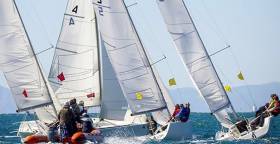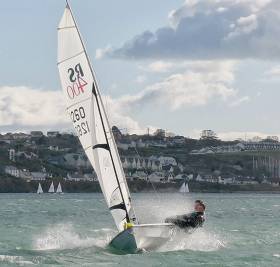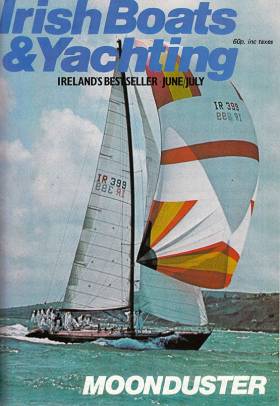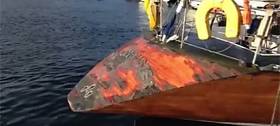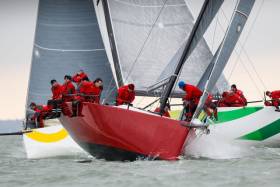Displaying items by tag: Royal Cork Yacht Club
Royal Cork Yacht Club Second At Greek 2K Team Racing Regatta
The Royal Cork Yacht Club was represented last weekend at a 2K Team Racing Regatta hosted by the Yacht Club of Greece. The two boat team, skippered by Fred Cudmore and George Kingston finished second, to a very strong Spinnaker Auspicious team, representing Spinnaker Sailing Club, UK.
The racing took place on the Saronic Gulf, in Plateau 25s, over 3 days. The Royal Cork were joined by 7 other teams, representing 5 different countries. ‘2K’ (2 keelboats) racing is a form of team racing where two boats sail against an opposing set, around a short and exciting course.
The RCYC team consisted of Fred Cudmore, Lisa Tait, Philip, Sarah and Eimear O’Leary, George Kinston, Emma Geary and Philip McGlade.
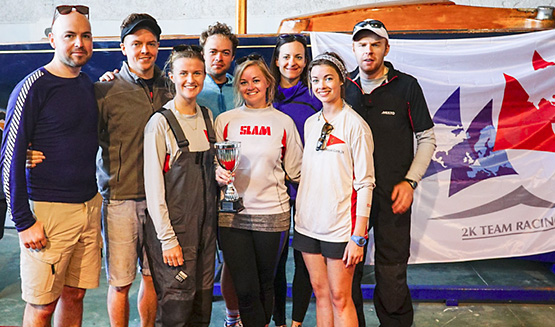
Royal Cork team pick up a trophy for second place. Left to right: Philip McGlade, George Kingston, Emma Geary, Philip O'Leary, Eimear O'Leary, Lisa Tait, Sarah O'Leary and Fred Cudmore
Day one of the regatta was unfortunately blown out due to high winds. Day 2 saw a long day on the water for all 7 teams, with a variety of wind conditions ranging from about 8-15 knots. The Royal Cork got off to a slow start, falling victim to the local knowledge of the Greek team off the startline, in what shaped up to be tense race with a flurry of protesting. The team regrouped and won all but one race that day, narrowly losing out to the Brits. RCYC finished the day lying in second, while Spinnaker Auspicious set the pace from the outset, with no losses at all that day.
After a long wait onshore on the Sunday morning of day 3, the teams went afloat, to contest part of a second round robin. The Irish won all of their races, allowing them a place in the final, to come head to head with Spinnaker once again.
The breeze was up, and there were champagne sailing conditions for the best of 3 final, with the stunning backdrop of Athens behind. The first race got off to a disappointing start, with the Brits enjoying a significant weight advantage and took off from the start line in what became a drag race around the course. The second race was much more hotly contested, with all RCYC team members hailing loads from the pre-start. Cudmore perfectly executed a duel with Brittish skipper Tom Hebbert, holding him off at the start, and Kingston started favourably against his counterpart, Sam Littlejohn on the left hand side of the course. The RCYC defended brilliantly throughout the first half of the race, but the Brits with the speed advantage fought back in an extremely intense final downwind and pulled off a well timed sweep at the very end, securing their 2-0 victory.
The Yacht Club of Greece provided hospitality, while the 2K committee led by Bruce Hebbert ran a great show as always. Next stop on the 2K circuit for the RCYC team is likely to be Gaeta, Italy in July, where the team will be gunning for their first victory.
2K Athens Results: 1st Spinnaker (GBR) , 2nd Royal Cork Yacht Club (IRL), 3rd Yacht Club Costa Olanda (NED/ITA), 4th Yacht Club Costa Smeralda (ITA), 5th Yacht Club Greece (GRE), 6th Team Chaos (GER/NZL), 7th DMTRA (NED)
RS400s Hit The Water At Royal Cork Yacht Club
Five RS400s hit the water in Cork on Saturday, the first day back for a fleet that has now grown to 11 boats in Cork Harbour.
Hosted by the Royal Cork Yacht Club, racing took place on the Curlane Bank and the 10 hardy souls completed 5 races in glorious sunshine and winds gusting to 25 knots.
John Downey and Sandy Rimmington of Monkstown Bay were clear winners on the day with a score line of three 1sts and two 2nds.
Dublin based dinghy supremos Barry MacCartin and Ronan Wallace were a convincing second and are proving to be the ones to watch for the regional circuit.
Twice national champs Alex Barry and Richie Leonard could only manage third however were delighted with their swimming practice.
George Kenefick paired up with Royal Cork junior Harry Durcan and they finished fourth, also getting in plenty of swim time as they blew off the cobwebs.
New to the class Tom McGrath rounded it out in 5th. It was great to see the young blood getting involved and Junior ace Harry Durcan joined Tom, moving to the front of the boat for the first time.
Thanks to OOD Ciaran McSweeney and all of his helpers on the day.
The class have a packed local and national schedule this year as they build towards the nationals in Schull in August.
This week’s sad video on Afloat.ie about the dilapidated and deteriorating condition of the late Denis Doyle of Cork’s very special Frers 51 Moonduster in northern Norway has led to a flurry of communication on social media, and all sorts of suggestions about how best she might be restored and used in the future. Inevitably, there have been many who reckon she should find her future back home in Ireland, and be properly restored here. W M Nixon isn’t so sure.
There was a period recently when the word “iconic” appeared so frequently as to become meaningless. But fortunately we’ve moved on from that level of gross over-use, and a certain rigour has returned to the deployment of this very useful and eloquent adjective. Which is just as well, for when you try to tell today’s rising generation of offshore sailors just what Denis Doyle and Moonduster meant to us during their twenty years of glory from 1981 to 2001, “iconic” and “inspirational” are the only words which will hit the target.
In fact, the complete force was a threesome, as it was Denis Doyle and his wonderful and supportive wife Mary (nee Woodward) and Moonduster. But even when Mary had passed on in 1993, such was the strength of the team inspired by them that Denis and Moonduster continued actively campaigning at home and abroad with the support of an army of friends. He did his final Fastnet Race with Moonduster in 2001 aged 81, and was gone from among us by the Autumn.
To say that Moonduster looked forlorn in the big shed in the winter of 1981-82 at Crosshaven Boatyard where she had been built is scarcely to begin to grasp just what “The Doyler and The Duster” had meant to Cork and to Irish sailing and to world offshore racing. They represented a level of commitment to the sport and to the communities it involved which few other people-and-boat combinations could match.
Awareness of this first came to me this in Cowes in the summer of 1969, when we’d taken a 35ft boat we built in Carrickmacross (as one does) down south to do Cowes Week and the Fastnet Race. We seemed to spend a lot of time in Groves & Guttridge’s yard with much hammering being heard from within our County Monaghan boat, and our only consolation was that there was even heavier hammering coming from within Dick Carter’s innovative Red Rooster beside us on the hard, with her huge lifting keel continuing to give problems.
Subsequently, Red Roooster went on to win overall in the Fastnet, while we with our very homemade boat were 122nd out of 250 entries - it truly took a helluva lot of boats to beat us. Yet it takes an effort to remember all that. But what I do remember vividly is a little exchange on the balcony of the Island Sailing Club where I was taking a break from the boatyard mayhem and maybe enjoying a beer or three, and certainly a breath of fresh air in the sunshine, as the last of the fleet from that day’s New York Yacht Club Cup race came into port.
Conspicuous among them was Denis Doyle’s first Moonduster, the very handsome Robert Clark-designed white 47–footer built in Crosshaven Boatyard in 1965. Moonduster was particularly conspicuous because, unlike the other boats coming up the Medina River under engine, she was being sailed by Denis with consummate skill, for he disdained to have an auxiliary engine, as had also been the case with his first Crosshaven-built Robert Clark offshore racer, the 38ft Querida of 1963.
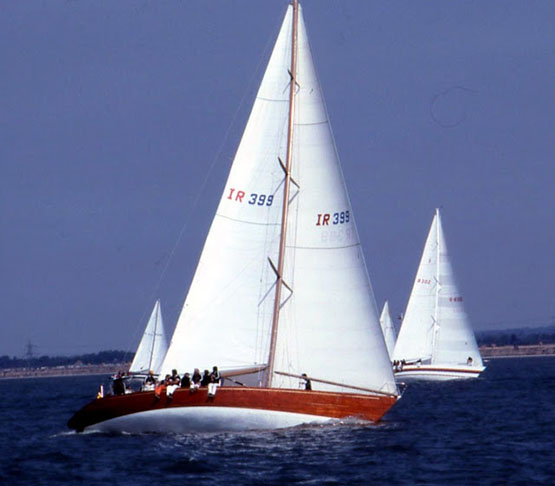
The Solent was only one of many venues to which Denis & Mary Doyle & Moonduster gave total commitment. This is the new Moonduster racing in the Admirals Cup of 1981.
Foolishly, I made some quip about the mad Doyler and his engine-less boat to a formidable matron who was beside me in the balcony crowd. She put me very firmly in my place. It emerged she was Denis and Mary’s Cowes landlady, and she was on the balcony to see her hero sail into port. It seemed that, ever since Denis and Mary and whatever boat they happened to be campaigning that year had been coming to Cowes, after careful research they’d selected this woman’s Bed & Breakfast to be their Cowes base. And they had stayed loyally and on the best of terms with her ever since. In the hierarchy of Cowes landladies, this put her very high up the pecking order.
“If a few more of these supposed gentlemen yachtsmen coming to Cowes Week brought the same sense and level of support, respect, generosity, consideration and kindness to the local folk as Mr & Mrs Doyle do, then Cowes would be a much more prosperous and happy little town” I was crisply informed.
You remember little exchanges like that long after numerous Cowes Weeks and three Fastnet Races have become a hazy memory. And the sign-off line was the killer punch. “On top of their friendliness, after Mary has seen Denis off in the Fastnet Race or whatever race is taking Moonduster away from Cowes, she’ll always drop by to say goodbye until next time, and present me with a lovely bouquet of flowers”.
The Doyler’s boat-owning history was fascinating. His first higher- visbility campaigning was with a Cork Harbour OD, but then for a while he took his first serious steps offshore with the converted 6 Metre Vaara. But it was with the 30 Square Metre Vanja IV – which he bought from Lough Derg – that he began to do more serious offshore stuff verging on into RORC events, which he continued with the “Straight Eight” Severn II, one of a group of impressive International 8 Metres which set the tone in Crosshaven in the 1950s and 60s.
However, having bought Crosshaven Boatyard to add to his extensive maritime business portfolio, he linked up with that noted designer of elegant offshore racers Robert Clark to build the 38ft Querida in 1963, and the much-loved 47ft white Moonduster (named after a racehorse) in 1965, with the link-up reaching a peak with Francis Chichester’s last boat, the Clark-designed Gypsy Moth V, in 1970.
As for Denis Doyle, the white Moonduster was succeeded in 1973 by the blue Moonduster, a massively powerful 47ft Sparkman & Stephens design which, alas, came to an unhappy end in the Pacific some years ago. But Denis Doyle had long since moved on, for after her for two or three years he had a fibreglass Ron Holland-designed Swan 44, a standard boat which couldn’t quite compete with one-offs, yet she was the only member of the Irish Admirals Cup Team of 1979 which managed to finish the disastrously storm-tossed Fastnet Race of that year.
But by 1980 The Doyler’s heart was set on a new Frers 51-footer which was to be wooden built multi-skinned in Crosshaven Boatyard. She was the absolute essence of Frers in style and appearance, yet the name Moonduster appears only once in an offhand sort of reference in the official Frers book, A Passion for Design. For if memory serves aright, German Frers allowed Dick Leonard of Crosshaven Boatyard access to the lines of the hugely successful alloy-built Frers 51 footer Blizzard, and Dick went to work and developed the detailed plans for wooden construction while the young up-and-coming Crosshaven designer Tony Castro was called in as consultant when added expert help was needed.
Thus Moonduster may have been Frers without, but she was pure Crosshaven within. And my goodness, but she was good-looking. When she first appeared in the nick of time for the Irish Admirals Cup trials in May 1981, you didn’t really look at any other boat. An elegantly varnished hull with effortlessly powerful performance, this new Moonduster was a yacht as yachts should be.
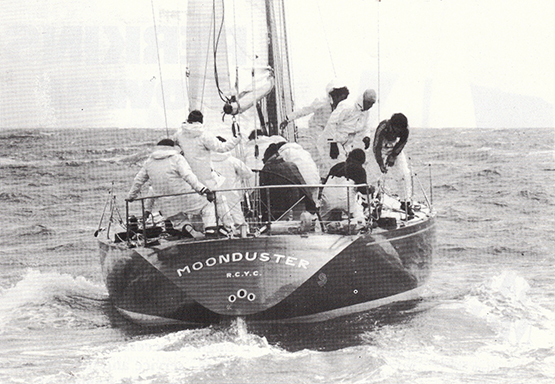
“An elegantly varnished hull with effortlessly powerful performance…..” Moonduster off Cork in May 1981. Photo: W M Nixon
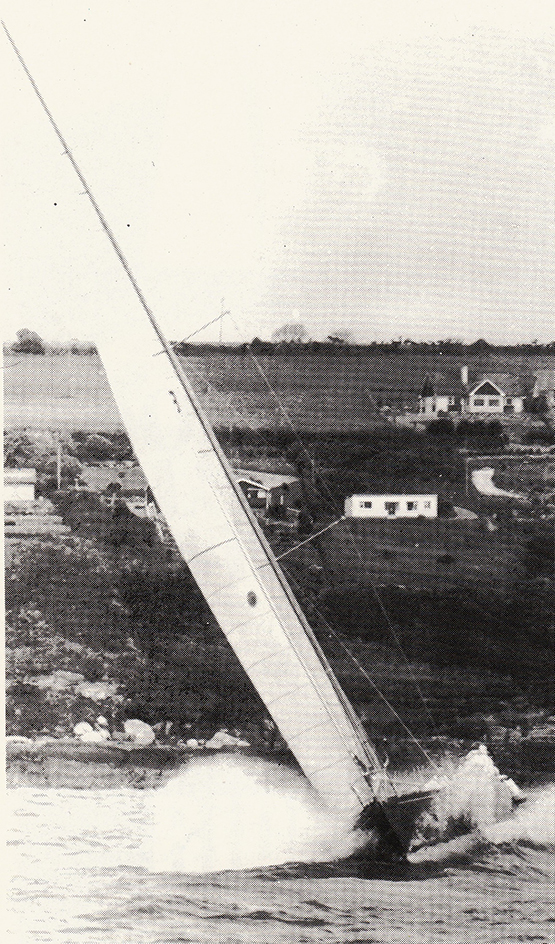
“There was only one boat to look at”. Moonduster leading the fleet in the 1981 trials. Photo: W M Nixon
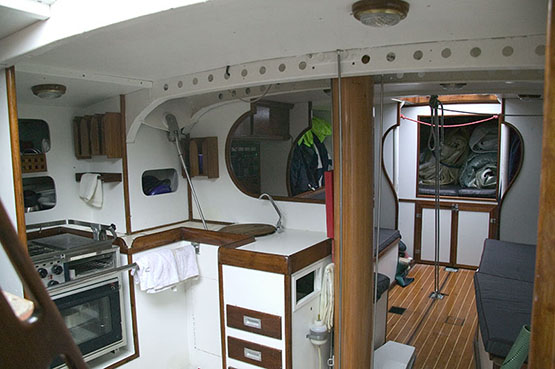
Moonduster’s interior is functional yet attractive
And though in some sense she may have been “unofficial Frers”, all I know is that a few month after her successful first season, when the 1982 Falklands War was under way I received a circuitous request from Buenos Aires for a print suitable for framing and wall-hanging of that photo of mine which appeared in the poorly-printed cover of the June/July 1981 Irish Boats & Yachting, one of the incarnations of Afloat. In due course, the carefully rolled and packaged print found its way past the war and on into Argentina and the Frers establishment, where presumably it joined the wall display among other classic Frers designs where Moonduster so rightly belonged.
But getting the photo to Mr Frers was only the beginning of The Last Moonduster Story. In 1982 Denis and Mary and Moonduster committed themselves to the Round Ireland Race and Wicklow with the same devotion that they gave to the Fastnet Race and Cowes in alternate years, and it was the making of the event, with Moonduster establishing a good record in 1982, and then an incredibly good Round Ireland record in 1984 which stood for many years.
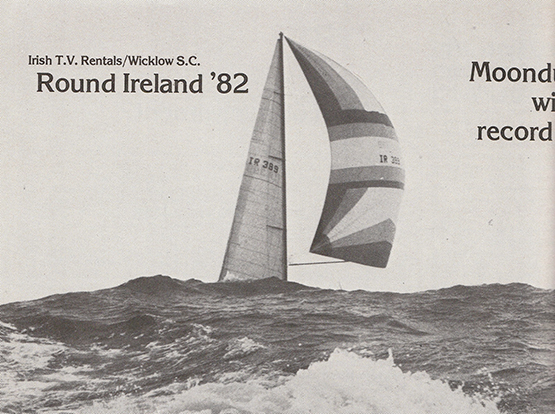
The beginnning of a great relationship – Moonduster approaching Wicklow for the finish of the Round Ireland Race of 1982.
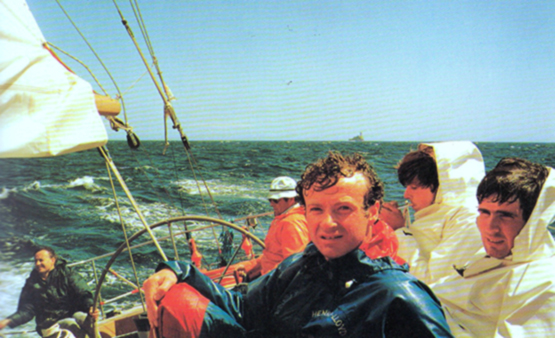
“The gang’s all here”. Moonduster on the way to her enduring Round Ireland record in the race of 1984, with Neil Hegarty on the helm (left), Donal McClement on the mainsheet, Brendan Fogarty (foreground), Davy Harte, and the late Grattan Roberts.
But involvement with Wicklow and Cowes at the appropriate times was only part of the Moonduster mystique. Another indirect Moonduster recollection that springs to mind is of stepping in to the Club Nautico de Montereale or whatever it’s called in Bayona in northwest Spain in 1995 after sailing out from Ireland across Biscay, and there was the Commodore honours board and beside it the honorary members list, and the top of the latter was one King Juan Carlos and beside him was Denis N Doyle. Moonduster enjoyed bringing a bit of real style to the scene in northwest Spain, while Juan Carlos was an old friend from the Admirals Cup years of the mid-70s, and they partied mightily when he came aboard Moonduster at Cabrera when the Irish boat was on her way to the Sardinia Cup at Costa Smeralda.
But whoever it was, king or crewman, Denis was the same utterly straight Denis Doyle. Photographers tried to capture the spirit of this very remarkable man, but it was impossible to get the essence of his character, for without being a fidget in any way, he was a man of action, and his character was most purely expressed through what he did.
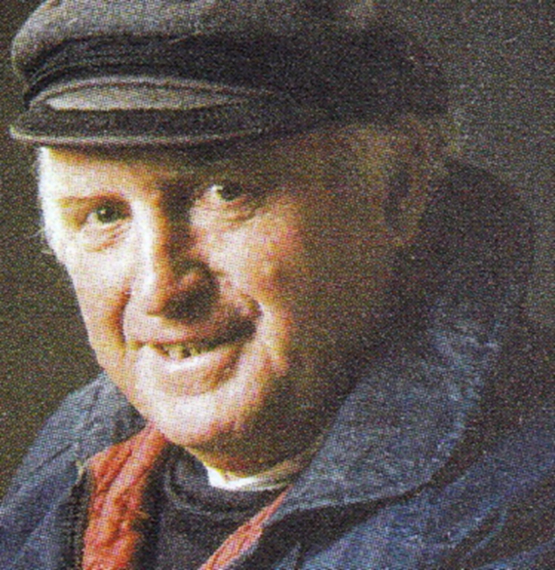
Even the best photographers had difficulty in capturing the essence of Denis Doyle in a portrait, for he was what he did. Photo courtesy RCYC
So when he died, it was only natural that nobody in Cork or Ireland wanted to take on Moonduster. It was a great relief when eventually she was sold to Trondheim far in the north of Norway for a sail training school, for in some ways that was what she had been in the Doyle ownership, with his great shipmate Colonel Barney Goulding introducing platoons of young soliders who became great crewmen, for unlike navy cadets, they didn’t come aboard with any preconceived notion of how a boat should be sailed and run.
But now the care of Moonduster in Norway has apparently gone pear-shaped and beyond. A saviour and guardian angel is urgently required. And if you insist and can organise it, by all means get her restored to full health in Ireland. But once that’s done, please take her away to join the classic offshore racers group in the Mediterranean. Take her away and keep her away for a good while yet. Fifteen years may have passed. But we’re still not ready to see Moonduster sailing in Ireland again without The Doyler at the helm.
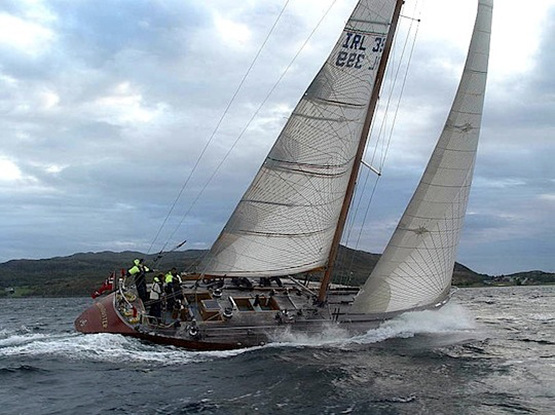
In her early days in Norway, Moonduster seemed to have settled well in her new home
Cork Week is Launched on Board LE Roisin in Cork Harbour
Cork Week is aiming to return to its glory days in July with amibitious plans for the event revealed this lunchtime at a regatta launch on board Irish Naval Service vessel, LE Roisin writes Claire Bateman.
Minister for the Marine Simon Coveney took time out from a busy political schedule to attend today's ceremony in Cork Harbour.
Held on a biennial basis by Royal Cork Yacht Club, Volvo Cork Week is one of Ireland's Grand Prix sailing events. It takes place from July 10th to 15th, and primarily attracts sailors for the quality of its racing.
As previously reported by Afloat.ie, this year’s racing includes a new event, the IRC European Championships, which will be an event in itself, based on the platform of Volvo Cork Week. The first edition of the RORC IRC National Championship took place in 2000, and has done so every year since. There are now seven IRC National Championships throughout the world, but up until now, there has been no continental event.
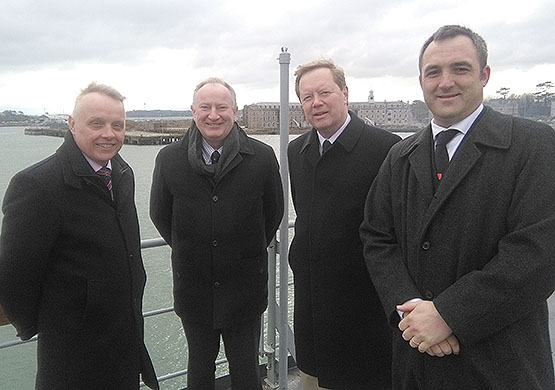
Mark Whitaker and Adrian Yeates of Volvo with Royal Cork's John Roche and Kieran O'Connell on the LE Roisin. Photo: Bob Bateman
Cork Week Chairman, Kieran O’Connell said he was feeling very confident that Volvo Cork Week 2016 will be a unique and exciting event, both on and off the water. 'It is a great achievement for Ireland to be given the chance to host an event of this calibre and we need to make it an event that will set the standard for future years'.
Some of the boats already entered include Anthony O’Leary’s new Ker 40 Antix. Anthony has been Captain of the Irish Commodores Cup Team on two occasions and has enjoyed successes too numerous to mention here. Tim Goodbody’s new J109 White Mischief from the RIYC will be showing her paces, The Tingle families’ new Alpaca X34 will also compete in their new X34. Ronan Harris from the RIYC will sail his J109 Jiga Maree, Paul O’Higgins also RIYC and another very well known and successful sailor has also entered. Kinsale YC Commodore Tom Roche will sail Meridian a Salona 45. Charlie Frize formerly a 1720 sailor will sail his Mills 36 from The Clyde Royal Northern and Clyde Y.C. French sailor Eric Gicquel will sail ‘Black Jack’ from Saint Malo.
The intention is for the IRC European Championships to be held at a different European location annually. The fact that the Royal Cork Yacht Club has been selected to host this inaugural IRC European Championship is a huge honour and reflects the esteem in which the entire Volvo Cork Week Organising Committee are held. As Afloat.ie reported earlier, this year’s event will also feature the inaugural Beaufort Cup, which invites sailing teams from their associated national services to race. The Beaufort Cup, supported by the Irish Defence Forces and part of a series of Irish Government commemorative events in 2016, hopes to develop bonds between national team members and international colleagues: 50% of each team must be active in any service they represent and it is anticipated that defence force teams from a number of countries will compete and also other services such as Police, Fire, Rescue, RNLI and Coastguard.
Minister Coveney, himself a life long member of the Royal Cork Yacht Club announced the official launch. He gave a very interesting talk On the Beaufort Cup. He also said how much he would like to sail in Cork Week 2016 but that would depend on how busy he might be at the time. The smile on his face said it all and he got a great cheer and applause for that. He has the gift of always speaking in a most interesting way and today was no exception He also spoke about his three special interests, Cork Harbour, Sailing and the Navy. Also present amongst the distinguished gathering was the French Ambassador to Ireland, Monsieur Jean Pierre Thébault, who also spoke very interestingly about the Beaufort Cup and its history and connections with France and Cork. Major General Kieran Brennan of the Beaufort Cup, Deputy Chief of Staff Operations, also spoke about the Beaufort Cup and it surely appears this is going to create great interest during Volvo Cork Week. Also present was Colonel Max Walker, British Defence Attaché, representing the British Ambassador to Ireland His Excellency Nicholas Chilcott.
Representing the Royal Cork Yacht Club were Admiral John Roche, Vice Admiral Captain Pat Farnan, Hon Treasurer, Pat Harte, Rear Admiral Dinghies Stephen O’Shaughnessy, Simon Brewitt, Chair Marina and Facilities Committee and Michelle D’Arcy, Chair Bar, House and Communications Committee. Also returning in her capacity as co-ordinator of Cork Week is April English.
Taking over as Director of Racing for 2016 will be Royal Cork’s well known and Ronan Enright with Mike O’Connor, International Judge, acting as PRO.
Mark Whitaker, CEO of Johnson & Perrott Motor Group commented, “Johnson & Perrott Mahon Point is delighted to once again partner with Volvo and the Royal Cork Yacht Club in supporting this high calibre event in the international racing calendar. Volvo Cork Week is a fantastic regatta that combines both serious competition and fun and which contributes very significantly to the sport of sailing and to the local economy.”
“With competitor interest at a high level, our team are looking forward to what promises to be yet another outstanding week for sailors and spectators alike” added Mr Whitaker, who himself is an experienced sailor and long-time member of the Royal Cork Yacht Club.
In addition to top class racing, the fabled on-shore tented village lets all crews interact socially in a fun way, which has become one of the main ingredients in the success of Volvo Cork Week. Saturday will see the family fun day to be held in the Village of Crosshaven with a myriad of events to attract all the members of the family and this will be attended by Dermot Bannon of RTE’s ‘Room to improve’. On Sunday the RNLI luncheon will take place and this will be hosted by RTE’s Francis Brennan of ‘At Your Service’.
Adrian Yeates, Managing Director of Volvo Car Ireland commented "Volvo Car Ireland, are looking forward to what promises to be a very exciting event in Crosshaven this Summer. This is the second year that Volvo, in conjunction with Johnson and Perrott Motor Group, will be the title sponsor of Volvo Cork Week, thus celebrating our continued relationship with sailing in Ireland and throughout the world.”
Queen of Irish Yachting Moonduster is 'Sad Sight' in Norway
There has been plenty of comment on social media about the current condition of the much loved Irish yacht Moonduster, the former Round Ireland record holder skippered by the late Denis Doyle of the Royal Cork Yacht Club. See the full video below.
'Sad to see this. Many happy hours on that beautiful vessel in and out of Cork Harbour', says Stu McLoughlin echoing many similar comments about the state of the one time pristine Frers 51 that was the pride of the Irish fleet in the 1980s.
Sad to see Moonduster looking like this!
Posted by SailCork.com on Saturday, 27 February 2016
Doyle owned four different Moondusters in his long career. His last boat, arguably the best known, the varnished Frers, was sold to Norway around 2005 where she is still sailing but as can be seen in the photographs not in the same state of repair as she had been in Crosshaven.
'...She's in a shocking state, clearly her current and previous owners never cared too much about her. However, she's still salvageable but for how much longer? says Mark Richards on Facebook.
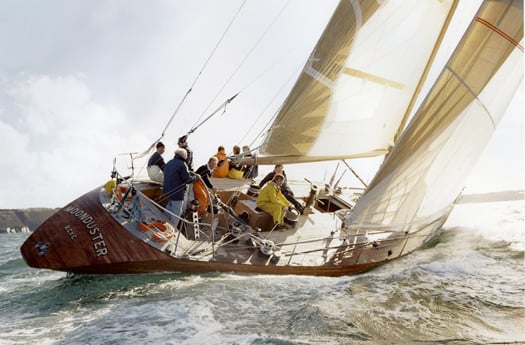
The queen of all fleets. Denis Doyle's legendary Moonduster was the flagship of Irish offshore racing for twenty years. Readers will recall Bob Bateman's 1988 classic photograph of Doyle at the helm. Doyle's enthusiastic support moved the Round Ireland Race into the international league, and his regular participation set performance standards which greatly enhanced the event.
Ted Crosbie on a Lifetime in Sailing
Sailing is, definitely, a ‘sport for life’ but “you have to find a bit of time for it and, if you have a family, don’t let it hog your whole life and try to take your family with you.”
Good advice that from one of Cork’s sailing icons, Ted Crosbie, one of the leading figures also in the Irish newspaper industry for many years through ‘The Cork – and currently Irish – Examiner and Evening Echo.’
Despite being a leading national newspaper owner for a long time, Ted has never sought personal publicity. So when I got the opportunity to interview him for my Podcast on Afloat, I was delighted to get his views on sailing which you can listen to here. Ted started sailing at the age of 10.
• Read also Ted Crosbie in the Spring edition of Afloat Magazine in shops next week.
Tom's Crosbie's boat 'No Excuses' is for sale here
RORC Easter Challenge Starts the Season on the Solent
The Royal Ocean Racing Club's UK domestic season fires up with the Easter Challenge, taking place on the Solent over the Bank Holiday weekend of 25-27th March. Last year, Anthony O'Leary's Royal Cork crew won the Spring event overall and this year the event is an important build–up to the Commodore's Cup in July. The Irish Cruiser Racer Association (ICRA) is reported to be considering sending two teams to defend the international title so a strong Irish entry in Cowes might be expected next month.
For many crews, the Easter Challenge marks a key date in their diary, by which their boat must be recommissioned and back in the water ready for the new sailing season. To help crews get up to speed again as quickly as possible, particularly those looking to enter this year's Brewin Dolphin Commodores' Cup, the RORC has set up the Easter Challenge as a start of season training regatta.
The RORC ropes in some of the world's best to carry out this tuition. The coaching team will once again be led by Jim Saltonstall, MBE. Saltonstall has played a pivotal role in the success of most of Britain's leading Olympic sailors including Sir Ben Ainslie, Chris Draper, Iain Percy, Nick Rogers and the RORC's own Principle Race Officer, Stuart Childerley.
He will be supported by the RORC's CEO Eddie Warden Owen, himself a former America's Cup coach with Team New Zealand and latterly with the Spanish Desafio Espanol team in Valencia in 2007.
Once again integral to the coaching will be North U. Regatta Services, with specialists Chuck Allen and Andreas Josenhans flying across to the UK especially for the regatta. Both are well known sailors and highly experienced coaches and sailing performance analysts in the USA.
Inshore racing at the Easter Challenge is scheduled to run from the Friday morning (25th March) until Easter Sunday early afternoon, allowing teams to get home for the evening, laden with the chocolate prizes they will have won. -- James Boyd
National 18s to Vote on Class Changes at EGM in Royal Cork
The National 18 dinghy class will hold an extraordinary general meeting on Saturday, 27th February at Royal Cork Yacht Club to vote on three new proposals for the three man centreboarder.
The first proposal seeks approval to allow Morrison division National 18’s to carry mainsail aligned to modern design and construction materials. The new mainsail can be made in either Dacron or HMPE/aramid fibre laminate.
Full details of the egm are carried in a notice downloadable below.
Ireland’s Boats & People – How Do We Get Them Together?
The recently-published ISA Survey of Club Racing commissioned and supervised by Board Member Jack Roy has started the process of putting together a realistic picture of how we sail and go afloat for recreation, and it was analysed on publication here in Afloat.ie.
It’s logical to have made the beginning with club racing, as racing provides its own narrative and a straightforward set of entry numbers and results. But it will become more complex as the national authority tries to provide realistic figures for day sailing’s less competitive aspects. And of course, once we enter the world of cruising as defined by sailing and boating projects which include passage making, both coastal and offshore, together with overnight on-board stops, then it can become much more difficult to get meaningful data.
Yet with the ISA’s Cruising Conference for February 20th already booked out within a few days of being announced on Afloat.ie, clearly that is an area in search of services and support, a section of sailing which is difficult to quantify yet obviously of strong interest to a significant number of boat enthusiasts. W M Nixon takes a look at how the complexity of our sport’s many specialities makes it difficult to provide a clearcut picture for possible recruits to sailing.
Where would we be without the International Optimist Dinghy? The little solo-sailing boxes and their attendant support teams of mum and dad and the dog and the old 4X4 or station wagon or people carrier or whatever may seem to take up an awful lot of space and time, and all just so that one little person can go sailing.
But at least that one little person does go sailing. The ISA figures are brutally straightforward. In terms of genuine turnouts afloat at clubs throughout Ireland, in boat numbers the active Optimists are exceeded only by the Lasers, and this is arguably because Lasers aren’t age-limited, whereas the Optimists most definitely are.
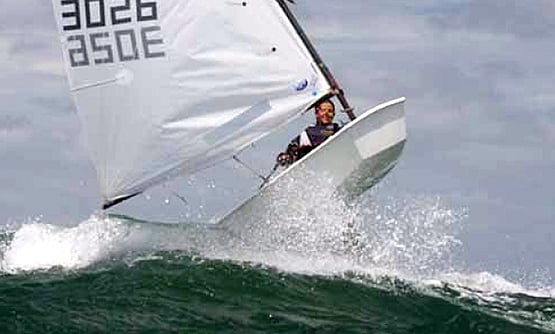
Optimist airborne. This is Ireland's second most popular class
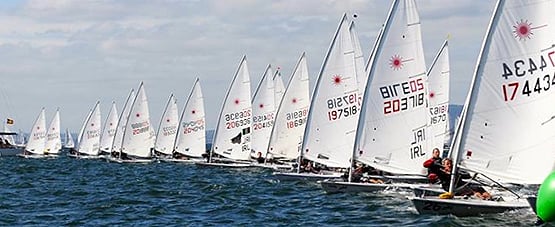
Ireland’s most popular dinghy class, the Laser is seen here at the Zhik Irish Nationals at Ballyholme
So we give a qualified cheer for the success of these two little boats. But it’s qualified because they’re single-handers which fail to provide any crew-relating sailing skills. Leading sailing figures as diverse as Des McWilliam of Crosshaven and Norman Lee of Greystones have been eloquent in promoting the notion that we should be doing more – much more – to encourage two-handed boats, and if we can persuade people into three-handed boats, well, so much the better.
Certainly that’s one of the reasons why our header photo says so much. A lone sailor in an Optimist or Laser promotes too much of a solitary, even an isolated image. And a two-handed boat like the GP 14, whose strong fleet figures in the ISA survey show the class’s vigour, is arguably just an act for a dynamic duo – it’s Strictly Come Dancing goes sailing…..
But getting three together to race a characterful boat like the National 18 with style – now that’s something special, that really is a superb combination of people skills interacting with sailing talent. And it’s a joy to behold. Yet anyone can see that for a complete beginner to sailing, this extraordinary silhouette of Tommy Dwyer’s National 18 against the November sky above the Hill of Howth will have an otherworldly air about it – “That’s not for me” is as likely a response as “Let’s have a go at that”.
Even those of us who have been in sailing for longer than we care to remember find the image decidedly thought-provoking, for we have some idea of what has been involved in creating the circumstances for this seemingly effortless balancing act, this lighter-than-air effect in the unlikely setting of a November afternoon.
Over the past year or so we have been recounting in Afloat,ie how the Cork Harbour National 18 Class, with very tangible backing from the Royal Cork Yacht Club, have been in the forefront of the development of the new ground-breaking Phil Morrison take on the long-established National 18, which is a developmental class which from time to time takes a leap in hull design, and moves forward in order to keep the spirit alive.
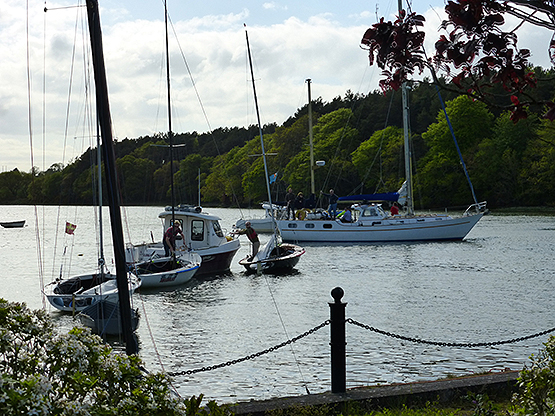
The National 18s are part of the fabric of Cork Harbour sailing. Before the new Morrison boats arrived in July, the old fleet were seen here in May 2015 after their annual race to Ballinacurra in northeast Cork Harbour in company with the Dwyer brothers’ cruising ketch. Photo: W M Nixon
Acceptance of this is something which seems to be bred into Cork’s National 18 enthusiasts, many of whom have the advantage of being firmly of the opinion that a proper dinghy needs three people to sail it. But the social matrix which has built up around Cork Harbour over many decades with this concept at its heart is not something which will necessarily travel easily to other areas, and although the six boats of the National 18 flotilla which visited Howth for the Open Day got a great reception and gave many people from other classes a marvellous time afloat, it’s probable that the very different mood around sailing in Dublin means that something so technically and socially challenging as a three man dinghy is a step too far.
Sailing in the greater Dublin area seems to exist within a framework of independent balloons. While there are those who will happily move from one boat type to another and cheerfully spread their talents and enjoyment about, by contrast there’s the Dublin Bay Sailing Club Thursday Evening Phenomenon.
Thursday is when the DBSC cruiser classes go out to race. And there’s an entire cohort of people, mostly folk who work in offices in the city, who on a Thursday evening go straight to Dun Laoghaire, get aboard a pontoon-based cruiser owned by someone else, go out and race in some very specific crewing job, then come back in and have supper in club or pub with their shipmates, and then that’s it until next Thursday. Just one evening each summer mid-week is their entire sailing programme. Weekends are for something else. And as for the hassle and mixed joys of boat ownership and maintenance, that’s not their department at all.
It’s a very metropolitan, very citified yet specialized way of doing things, and Dublin is one of the very few cities whose location facilitates it. It will be fascinating to measure it, for Dublin’s way of sailing is steeped in history and tradition. But for now it’s refreshing to look at a place which has had a sailing tradition in times past, but somehow lost it, yet it’s coming back again, and one of the good news stories towards the end of 2015 is that the new Youghal Sailing Club has been accepted into the ISA fold.
Youghal at present is a difficult place for sailing, as the tidal power of the mighty Munster Blackwater sweeps straight through the estuary and along the old town’s waterfront, and the creation of any meaningful modern facilities will have the immediate difficulty of silting by incredibly adhesive black mud.
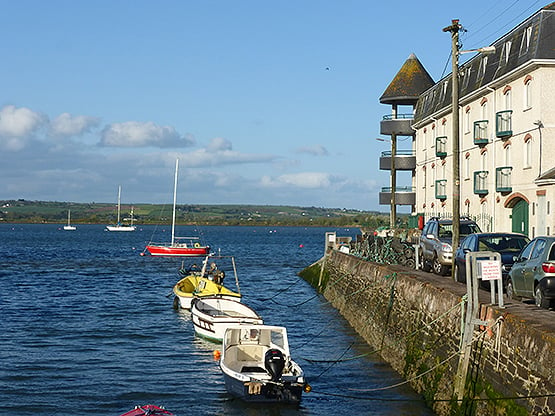
With the sun out, and the tide in, Youghal looks to be an ideal location for the easy installation of a marina….....Photo: W M Nixon
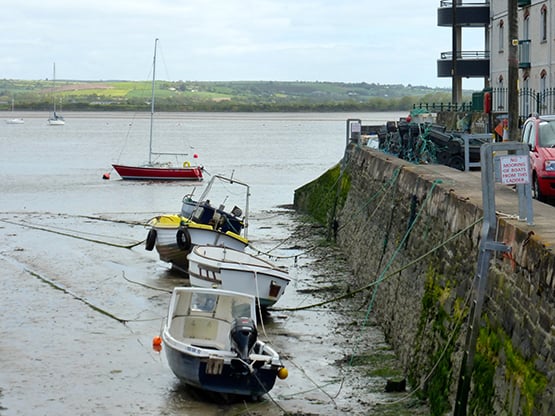
….but with the sun in and the tide out, the mud problem is revealed. Photo: W M Nixon
Thus, as dedicated Afloat.ie readers will have recently observed, no sooner had one group announced that a marina in Youghal was on the way than another longer-established group quietly suppressed the story, as they’re well aware of the engineering and dredging difficulties involved, and premature announcements will only slow any project in the long run.
In the fullness of time, a marina at Youghal will be a godsend for any cruiser plugging along the south coast. It’s not always the easiest coast in the world to make a passage along, sometimes it can seem an awfully long way to Cork from Dunmore East or Kilmore Quay even if you do make stopovers at Dungarvan or Helvick, and there are times when the hardiest seafarer is glad enough to get his boat secured to a good big pontoon.
But that’s for the future. Meantime, the locally-based keelboats are using either the restless anchorage off the town, or the more serene pool across the estuary at Ferry Point on the east shore, while the new club’s flotilla of GP 14s are stored in spare warehouse space during non-sailing time, and when they do go sailing it turns out their clubhouse is a moveable feast - it’s a caravan which can be towed to a choice of sailing locations.
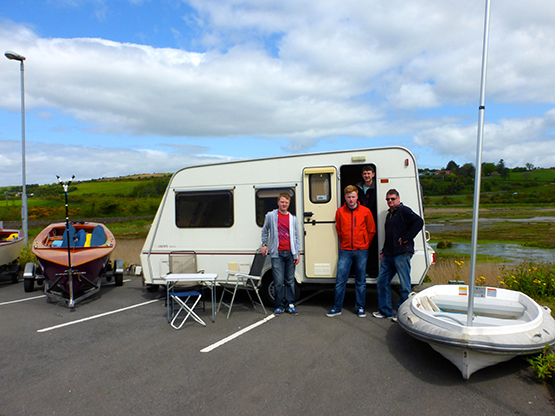
A moveable feast. Members of the newly-affiliated Youghal Sailing Club with their caravan HQ, Adrian Lee in doorway. Photo: W M Nixon
On the national stage, it is young Youghal GP 14 sailor Adrian Lee who has been among those flying the club’s flag, and there’s hope in the air. When we were there in May on a fine day that promised a summer which never arrived, we couldn’t help but think that when they do get their facilities and maybe even a clubhouse, they’ll look back to the days of the caravan and ad hoc racing arrangements with sweet nostalgia. For sometimes, it’s much better to be travelling than it is to arrive.
But for the rest of us, the message from Youghal is simple. The sea is for sailing. Use it or lose it. By all means get proper people surveys done which indicate the way numbers are shaping up and things are going. But really, if you want to persuade people to go sailing, the best way is by example, getting afloat as much as possible yourself. And maybe then you’ll find the time to welcome aboard newcomers too.
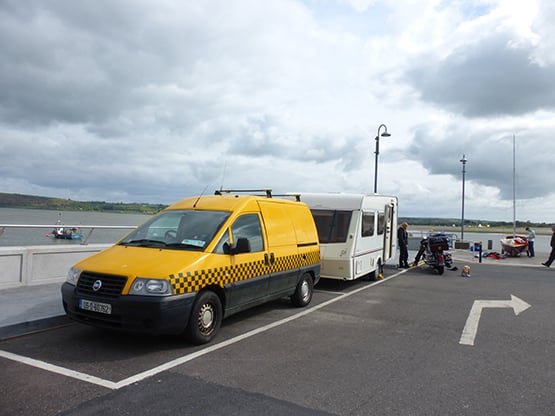
Reviving Youghal sailing – on race days, the club’s caravan is simply towed down to the pier and the races are started from there. Photo: W M Nixon
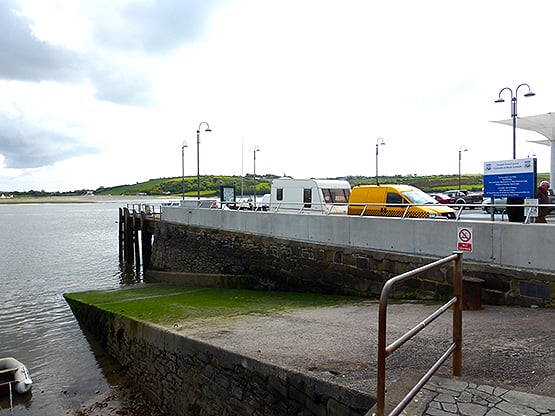
Youghal’s massive public slip provides launching for the YSC sailing dinghies, but during 2015 the boats had to be stored at the other end of town when not in use. Photo: W M Nixon
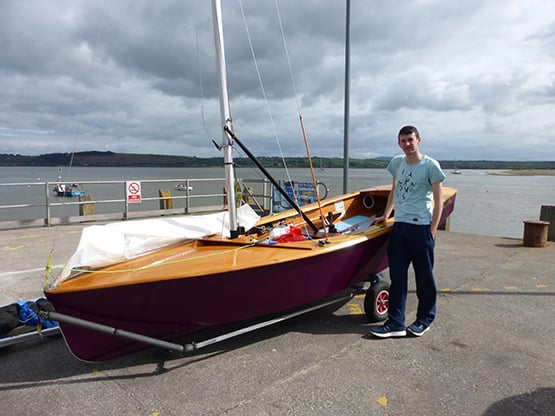
The pace-setter. Adrian Lee of Youghal SC with his Duffin-built GP14. Photo: W M Nixon
Click to download: ISA Survey of Club Racing
Cork Week Announces 'Beaufort Cup' for International Services Teams
The inaugural Beaufort Cup will take place this July hosted by the Royal Cork Yacht Club, Crosshaven, Co Cork, Ireland, as part of the highly successful Volvo Cork Week. It will be part of a series of Irish Government supported National, and International commemorations in 2016, to recognise the significant events that took place a century ago, leading to the creation of an Independent Irish Republic.
The Royal Cork Yacht Club, supported by the Irish Defence Forces is inviting services from Ireland, Europe, and further afield, to compete for the Trophy. It is hoped that Defence Force Teams from a number of countries will compete and also other services such as Police, Fire, Rescue, RNLI and Coastguard service teams.
“The Beaufort Cup invites sailing teams from their associated national services, 50% of each team must be active in the service they represent. Racing will take place over five days in a mix of challenging offshore and tactical inshore racing. Teams will get the chance to enjoy the renowned social experience of Volvo Cork Week and the winning team will also have €10,000 donated to a nominated charity of their choice while the winner will also be eligible for the ‘Boat of the Week’ prize at Volvo Cork Week 2016” says Kieran O’Connell, Chairman of Volvo Cork Week.
'It is with huge excitement that we announce the inaugural Beaufort Cup which is going to be part of Volvo Cork Week 2016. This event will attract teams from many countries and will add a unique and exciting element to the already fun packed Volvo Cork Week 2016', O'Connell say.
This event hopes to develop valuable bonds between national team members and international colleagues alike, through a competitive, but also very sociable, event. The Beaufort Cup represents a fantastic opportunity to strengthen international ties through offshore sailing and closely fought inshore racing in the natural maritime amphitheatre that is Cork Harbour.
The inaugural event, hosted by the Royal Cork Yacht Club, will truly be a historic occasion and the Irish Defence Forces are delighted to have the opportunity to support, and compete, in the Beaufort Cup. The Irish Naval Service Headquarters is located in the heart of Cork Harbour and will play a strong supportive role in the event.



























